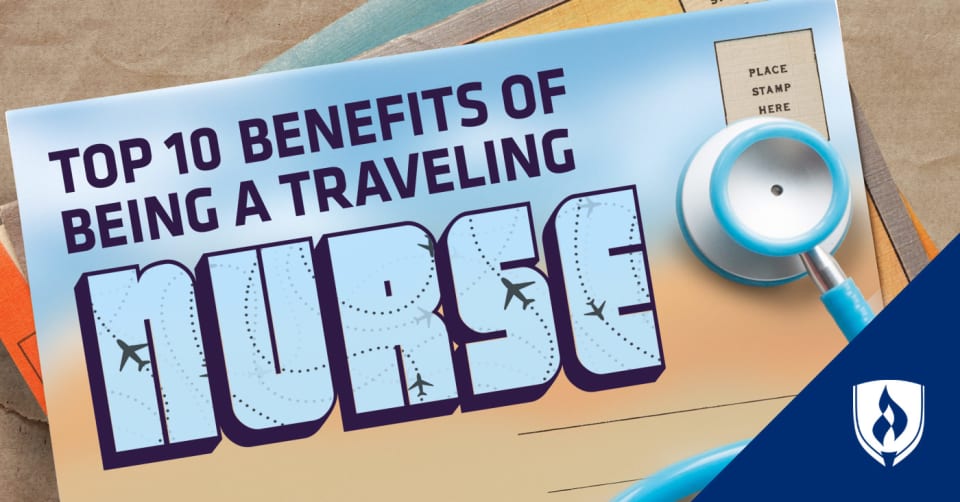
If you’re looking for a career in an in-demand field, look no further than nursing. The profession is projected to grow by 15 percent through 2026, which is much faster than the national average for all occupations. As the healthcare industry strives to keep up with the strain placed on it by an aging population, more and more nurses will be needed.
This increased demand in healthcare can sometimes be more than a facility can handle. That’s where a traveling nurse comes in—they travel across the country to the places most in need of them. With each new location comes fresh challenges, people and adventures.
Get Your Nursing School Questions Answered at a Nursing Information Session
What is a traveling nurse?
Before we dive into the benefits, let us answer your first question: What is a traveling nurse? A traveling RN goes from facility to facility around the country, helping to fill shortages in certain areas. Because nurses are badly needed, a traveling nurse is temporarily stationed to fill voids. Assignments for traveling nurses can range from 13 to 26 weeks and are available for many different types of nurses. These nurses are considered independent contractors and often work for travel nursing agencies that specializing in finding assignments and negotiating pay and benefits.
10 Perks of being a traveling nurse
Now that you’ve got a better understanding of what traveling nurses are and how they fit into the healthcare system, let’s take a look at some of the perks of life as a travel nurse. Traveling nurses enjoy a unique mix of benefits. Most prominently, they experience a stable, in-demand career and the exciting variety that travel brings. But that’s not all—keep reading to learn more about some of the best perks of being a traveling nurse.
1. Your schedule will be flexible
Travel nursing positions vary in length of time, location and position. You can specify your positions based on your needs. Travelling from one new place to another is exciting, but it can also be draining. Flexible scheduling allows you to take a break when you need to between contracts or arrange to be near your family for important events. In many positions, you can also arrange your weekly schedule for longer weekends and shorter work weeks.
2. You’ll be well compensated
Nurses work hard and are compensated well. As a travel nurse, you have an opportunity to make even more money than your stationary counterparts.
“Traveling nurses typically see higher pay packages compared to staff nurses,” says traveling nurse Jacqueline Nguyen, RN.
This is especially true if you have a specialty or work overtime. Certain locations will also pay more than others. This financial stability can allow you peace of mind as you explore new territory in your travels.
3. You get to see the country in ways most people don’t experience
What’s the biggest perk of being a traveling nurse? The traveling, of course! Living out of a suitcase may not be for everyone, but for those with an adventurous spirit, travel nursing can take you and your career to new heights.
“It’s exciting to travel all the time at first, but after a while, it’s exhausting. Living in a different and new city means wanting to do everything. It has helped me step out of my comfort zone, gain more confidence and learn so much more about nursing and myself,” says Nguyen.
It’s also an opportunity to meet interesting locals. Travel nurses can extend their contracts to stay in a location longer if they wish. It allows them to see how nursing varies across different parts of the United States. And it provides a new way for family and friends to visit and explore, explains Nguyen.
4. You’ll likely receive other perks and incentives
Worried about the trouble of continuously searching for new contract positions? You don’t have to go it alone—travel nursing agencies will find assignments for you. Additionally, many agencies will cover the costs of travel and find or provide free or reduced-price housing. Some will even cover utilities. These perks are above and beyond the standard benefits you’ll receive, such as health and dental coverage.
5. You'll get to explore what you love about nursing
Another perk of being a traveling nurse is the ability to dabble in a variety of areas in order to help you decide which you like best. That way you’ll be confident once you decide you’re ready to settle in one place and take a permanent position.
“One of the perks of being a traveling nurse is the experience with different hospitals. I worked in for-profit, nonprofit, trauma centers and community hospitals. It was nice to experience the different types, and I found that I loved teaching hospitals,” says Nguyen. “I liked trying out a hospital and only having to commit for 13 weeks. Even if you hate it, you can do anything for 13 weeks.”
6. You'll learn skills beyond nursing
Not only will you be able to hone your nursing skills, but you’ll develop a variety of other valuable skills as well.
“As a traveling nurse, I gained experience with different types of ICUs and patient experiences that I may not have gotten staying at one hospital as a staff nurse,” says Nguyen.
You will encounter an assortment of different people and situations, which will force you to be adaptable, think critically and learn to communicate effectively. When applying for future nursing jobs, you’ll be able to draw upon your experiences to demonstrate these practical skills that will help you on the job. There’s also something to be said for developing the life skills needed to pick up and move to new locations, find your way around and get acquainted with your surroundings.
7. You'll meet all kinds of people
“Meeting new people is definitely a perk of travel nursing, whether it be travelers or staff,” says Nguyen
As you go from facility to facility, you’ll have the opportunity to connect with people from all different walks of life, which broadens your perspective. You’ll also be able to build your network while working alongside a variety of healthcare professionals. You never know when one of those relationships could translate to a future job opportunity.
8. You’ll have job security and room for advancement
Like we said earlier, demand for registered nurses is projected to grow more than twice as fast as the national average rate. Add to that a comfortable 2016 median annual wage of $68,450 and a career in nursing becomes even more coveted—and with the nursing shortage, you know you’ll be needed more than ever.
Travel nursing can help your career in the long run, too. Your experience as a travel nurse will provide you with a unique chance to see many sides of the nursing profession in a relatively short span of time. This will help you pinpoint the direction in which you’d like to pursue—and in nursing, you’ll have a multitude of options to pick from when you decide to advance your career.
9. Workplace politics are minimized
Office politics can be found in any workplace, and nursing is no exception. In high-stress jobs, tension between coworkers can run even more rampant. But when your assignments typically range from three to six months, it’s easier to avoid the drama. If you’re placed in a facility with unfavorable office politics, don’t worry. Traveling RNs get to enjoy a variety of workplaces, and you’ll be back on the road in no time.
10. You'll get to help people who really need it
Nursing is one of those professions where you’ll directly impact people’s lives on a daily basis. It’s not an easy career, but nurses are an instrumental piece of the healthcare puzzle. Your influence as a traveling nurse will be even greater because you will likely be sent to areas that are in desperate need of help. You’ll be at the front lines of care, seeing the fruits of your labor right before your eyes.
How to become a travel nurse
Now that you’ve seen some of these exciting benefits, you may be wondering how to become a traveling nurse. Travel nurses need either an Associate’s or Bachelor’s degree in Nursing. They’ll also need to take the NCLEX-RN exam to become licensed. Most agencies that staff traveling nurses like to see at least a year of experience as an RN before voyaging out on assignment.
Let your career take flight
If you’re adventurous but want the security of an in-demand career, explore new horizons as a traveling nurse. Just because you’re choosing a secure career path doesn’t mean you have to be tied down. Capitalize on the current growth of the healthcare industry and help fill shortages to care for communities all over the country. You’ll also be a valuable part of the healthcare system—helping patients when they need it most.
It’s not often you have the opportunity to experience both spontaneity and security, but being a traveling nurse offers just that. But first you need to become an RN. We break down the process in four simple steps in our article, “How to Become a Registered Nurse: Your Step-by-Step Guide.”
EDITOR'S NOTE: This article was originally published in October 2014. It has since been updated to include information relevant to 2018.




